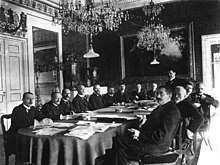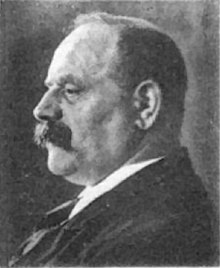Johannes Giesberts

Johannes Giesberts , also Johann (born February 3, 1865 in Straelen , † August 7, 1938 in Munich Gladbach ) was a German trade unionist and politician ( center ). He was the first German postal minister (1919 to 1922).
Life and work
Giesberts was born the son of a baker. After attending elementary school, he had to break off training as a baker for family reasons and then worked as a worker until 1899. He had been active in the Catholic labor movement since 1893 and worked from 1899 to 1905 as an editor for the Westdeutsche Arbeiterzeitung in Munich-Gladbach . At times he was also employed as an editor for the central newspaper of the Christian trade unions .
Political party
Giesberts was a member of the Center Party . From 1912 to 1933 he was on the executive committee of the Reichstag parliamentary group.
MP
Giesberts was a member of the council of Munich-Gladbach from 1906 to 1918 . He was a member of the Reichstag from 1905 to 1918 and a member of the Prussian House of Representatives from 1906 to 1918 . During the Weimar Republic he was a member of the Weimar National Assembly in 1919/20 and was a member of the Reichstag from June 1920 to March 1933 . In parliament he represented the constituency of Düsseldorf -East.
Public offices

On January 1, 1918, Giesberts was appointed to the Reich Economics Office as a socio-political adviser and, after the Reich Labor Ministry was formed , he was appointed State Secretary there in October 1918. From February 13, 1919 to November 22, 1922, he served as Reich Post Minister in the Reich governments headed by Reich Chancellors Philipp Scheidemann , Gustav Bauer , Hermann Müller , Constantin Fehrenbach and Joseph Wirth . He was also a member of the German delegation to the Paris Peace Conference in 1919 under the leadership of Ulrich von Brockdorff-Rantzau .
Conclusion
The Christian union leader Johann Giesberts played a decisive role in the upswing of the labor movement in the empire. As a longstanding center member of parliament, he made an unmistakable contribution to the political modernization of the Wilhelmine Empire. As Reichspostminister in the early Weimar Republic, he saw himself entrusted with the difficult task of reorganizing his communications authority. He is a politician who rose from a humble background and who has made a contribution to the social movement and democracy in Germany.
Honors
- Johann-Giesberts-Platz in Straelen
- Giesbertsstrasse in Nuremberg
- Johannes Giesberts Park in Cologne
Works
- From my life , 1924
literature
- Johannes Fischart (d. I. Erich Dombrowski ): Johann Giesberts . In: Die Weltbühne 30/1919, p. 64 (series "Politicians and Publicists"). The portrait also appeared in the volume "The old and the new system" (1925)
- Helga Grebing : Giesberts, Johann. In: New German Biography (NDB). Volume 6, Duncker & Humblot, Berlin 1964, ISBN 3-428-00187-7 , p. 375 f. ( Digitized version ).
- Manual dictionary of the postal system , 2nd edition; P. 330
- Ludwig Rosenberg / Bernhard Tacke : The way to the unified union . Edited by the DGB Federal Board. Printing: satz + druck gmbh, Düsseldorf 1977
- Karsten Ruppert: Giesberts, Johann . In: Lexicon of Christian Democracy in Germany. Schöningh, Paderborn 2002, p. 250.
- Nicolas Peter Schreiber: From Worker to Reich Minister: Johann Giesberts (1865 - 1938). 40 years of politics in the Christian social workers' movement . Publishing house of the historical association for Geldern and surroundings eV , Geldern 2011 ISBN 978-3-921760-48-2
Web links
- Literature by and about Johannes Giesberts in the catalog of the German National Library
- Giesberts, Johann in the database of members of the Reichstag
- Biography of Johann Giesberts . In: Heinrich Best : database of the members of the Reichstag of the Empire 1867/71 to 1918 (Biorab - Kaiserreich)
- Johannes Giesberts in the online version of the Reich Chancellery Edition Files. Weimar Republic
- Biography at the Konrad Adenauer Foundation
| personal data | |
|---|---|
| SURNAME | Giesberts, Johannes |
| BRIEF DESCRIPTION | German trade unionists and politicians (center), MdR |
| DATE OF BIRTH | February 3, 1865 |
| PLACE OF BIRTH | Straelen |
| DATE OF DEATH | August 7, 1938 |
| Place of death | Munich Gladbach |

